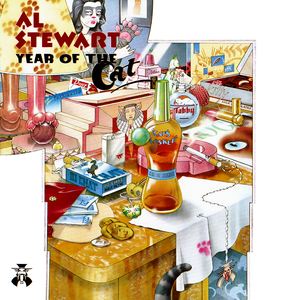Published on Nov 1, 1998
With the vastness of the Pierce Archives, it sometimes becomes
tough for me to decide just what to listen to on a particular day.
I change my mind more often than a politician changes their stand
on issues just before an election; were it not for reader requests,
I think many albums would still be collecting dust, awaiting their
turn to be skewered on these pages.
A few days ago, I happened to catch sight of Al Stewart’s 1976
breakthrough release
Year Of The Cat, but instead of slapping it on the
turntable, I just happened to spend some time looking at the cover
and reading the liner notes… then back it went to the shelves.
Into the picture enters reader Owen Cory, who no more than 72 hours
afterwards asked us to give it a spin on the turntable.
More than 20 years after Stewart caught people’s attention with
the title track, it sounds as fresh as it ever did. Stewart’s
unique vocal delivery style is what helps to seal this one, but the
musical development of the track cannot be overlooked. Some of the
credit has to be given to producer Alan Parsons, who might seem
like the least likely person one would choose to produce a record
like this. After all, the music is much more direct than the
layered styles that the Alan Parsons Project would become known
for.
In fact, sometimes it doesn’t seem like Parsons is indeed
producing this one, for the magic that one comes to expect from his
flawless production work isn’t always there.
Year Of The Cat opens with a weak effort, “Lord Greenville,”
which fails to hook the listener in during the most crucial point
of the album. If you were expecting an album with songs that all
were in the same vein as “Year Of The Cat,” then “Lord Greenville”
is a quick wake-up call to reality.
While things turn towards the better with the next track “On The
Border,” it isn’t until Stewart comes forth with “Midas Shadow”
that things really seem to fall into place with
Year Of The Cat. A more up-tempo number with a crisper
sound, this is the kind of tune that Stewart knows how to deliver
quite well. The remainder of the first half of the album continues
in a similar vein; “If It Doesn’t Come Naturally, Leave It” might
sound a little disrespectful, but is a hidden gem on this
album.
The second half of
Year Of The Cat is decent enough, but often sounds somewhat
uninspired — that is, until you get to the title track which
closes the album. Why this song is stuck so far at the end, I will
never understand. Of the four tracks here, “Broadway Hotel” stands
out as being the best of the hidden gems.
So what caused
Year Of The Cat to be the album that sent Stewart into his
15 minutes of fame? Some say his habit of historical name-dropping
was the key; I wouldn’t have picked up on some of it had I not read
the lyrics. (Then again, I’ve been listening to the song “Year Of
The Cat” for over two decades now, and I just recognized the Peter
Lorre reference when listening to the record for review.) While the
historical stories might have been a lark in 1976, the name
dropping is common-place these days, and there have been better
story-telling songwriters. My thought is that Stewart was in the
right place at the right time, and he was able to capitalize on the
moment. (I do think, however, that the song “Time Passages” is his
best that I remember from my youth.)
If you are just looking to add one song to your collection, then
you may wish to pass on
Year Of The Cat and go for a greatest-hits album. If,
however, you want to break through the surface past the hit song,
then
Year Of The Cat is a sometimes rewarding, sometimes
difficult experience. Once I get to listening to
Time Passages, I’ll tell you if the journey is worth
extending.
